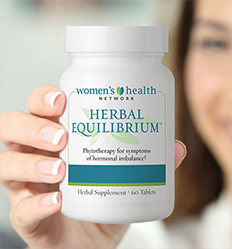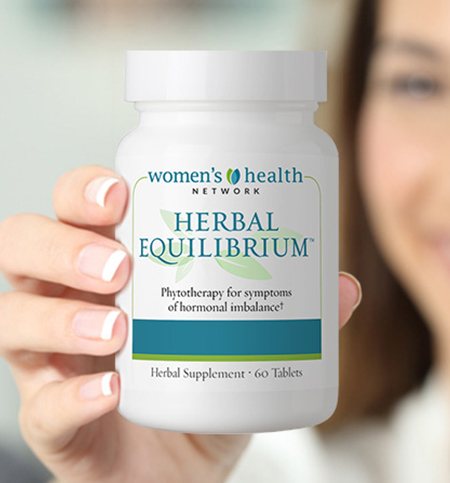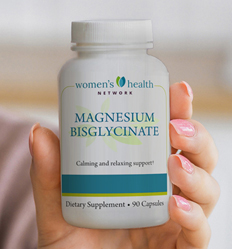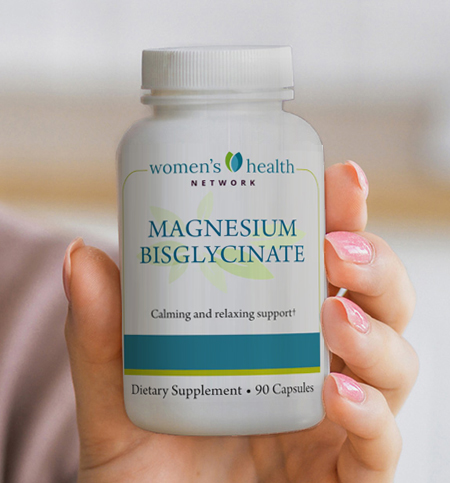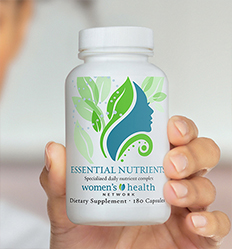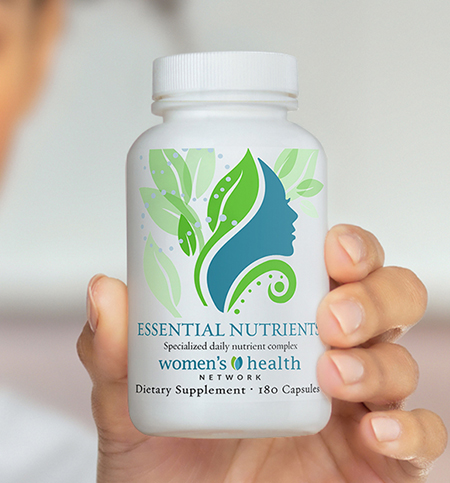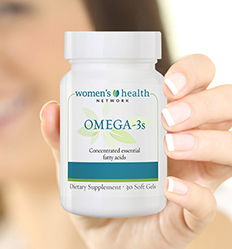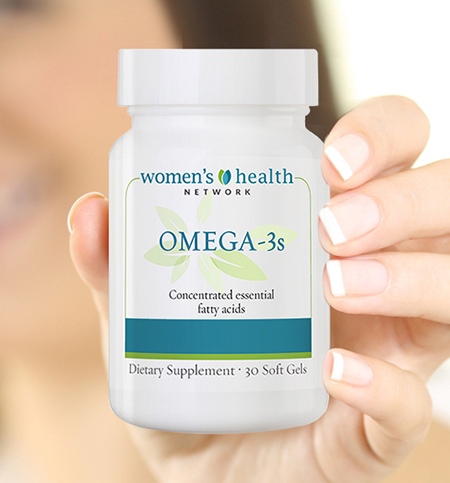Authored by Dr. Sharon Stills, NMD
If you dread the days or even weeks before your monthly period starts because of difficult premenstrual syndrome (PMS) symptoms, here is some good news for you. Mother Nature offers real PMS relief in the form of vitamins, herbs and, other natural compounds and supplements that bring balance back to your hormones so you can feel like yourself – all month long.

Symptoms of PMS
PMS refers to a collection of physical, emotional and psychological symptoms that occur during the latter half of a woman’s menstrual cycle. Symptoms typically start in the last week before menstruation begins and go away within four days after bleeding starts. PMS can vary greatly in severity and duration, ranging from mild cramping and other discomforts just before your period to debilitating symptoms that significantly disrupt your life for a week or more each month.
Symptoms of PMS include:
- Mood swings and emotional instability
- Irritability and increased sensitivity
- Anxiety
- Sadness and depression
- Fatigue and low energy levels
- Bloating
- Breast tenderness
- Headaches or migraines
- Muscle aches and joint pain
- Food cravings
- Digestive issues, including diarrhea
- Insomnia or excessive sleepiness
- Difficulty concentrating
- Acne breakouts
- Decreased libido
- Increased sensitivity to noise or light
What causes PMS?
During a typical 28-day menstrual cycle, reproductive hormones estrogen and progesterone are designed to ebb and flow in a natural rhythm. When women have an underlying hormonal imbalance, however, normal hormonal fluctuations can intensify and become dysregulated, disrupting delicate hormone-to-hormone ratios and triggering hormonal PMS symptoms.
PMS also appears to be related to a disturbance in the body’s hypothalamic-pituitary-adrenal (HPA) axis, a hormone-neurotransmitter feedback loop that helps to regulate different hormonal systems, including reproductive hormones and the body’s hormonal stress response. Ever notice that when you are really stressed out, your PMS symptoms are even more intense? The interconnectedness of your hormones means that when one hormonal system is off track, others imbalances can form – or become worse.
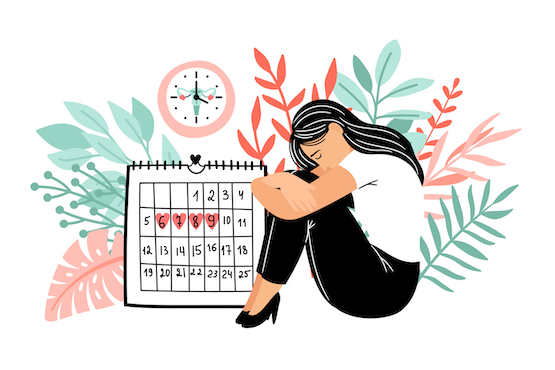
What this interconnectedness also means is that when one hormonal loop is off track, others can be affected. If you have a lot of stress in your life and it’s enough to throw cortisol and other stress hormones into turmoil, for example, you may find that your PMS symptoms are worsening at the same time.
Natural supplements and vitamins/herbs for PMS
What all of this means is that ending PMS symptoms starts with giving your body the support it needs to restore hormonal balance. When you address the underlying reasons driving your monthly misery, the burden of even your worst symptoms can be alleviated.
And this is where vitamins and other natural supplements come to the rescue…
Chasteberry (Vitex agnus-castus)
Chasteberry is a traditional herbal remedy that has been used for centuries to manage PMS symptoms. Researchers believe that chasteberry works by affecting the hypothalamic-pituitary axis, helping to correct estrogen-progesterone imbalances by helping the body produce more progesterone. It also increases dopamine, one of the body’s main “feel good” neurotransmitters. Chasteberry is particularly helpful for relief of PMS-related fatigue, breast pain, irritability and mood swings, headaches, and bloating and abdominal discomfort. You can try chasteberry as an herbal tea. For optimal dosing, try a supplement. Chasteberry is a prime ingredient in Herbal Equilibrium, our exclusive formula for hormonal balance.
Magnesium
Magnesium helps relax the smooth muscles of the uterus, reducing the intensity of cramps. The mineral also acts as a natural tranquilizer, promoting a sense of calm and helping to alleviate anxiety and irritability related to PMS. For your hormones, magnesium activates enzymes involved in hormone production and metabolism, supporting conversion of inactive hormone forms into their active forms and promoting overall hormonal balance. Food sources of magnesium include spinach, almonds, avocados, dark chocolate and black beans.
Vitamin E
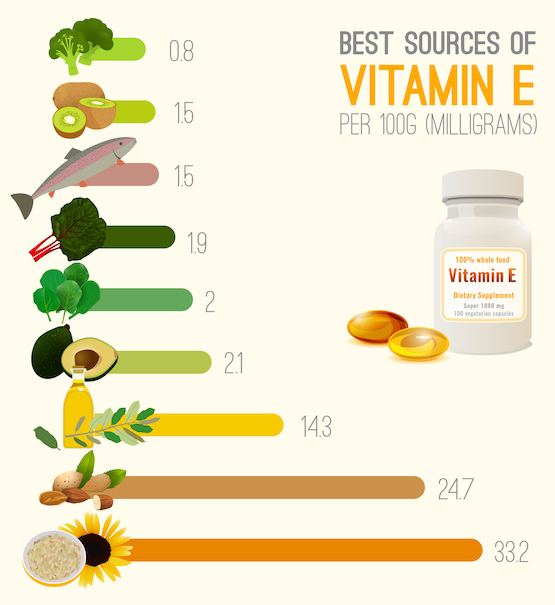
In a randomized double-blind trial study, participants who took Vitamin E found significant relief for PMS-related anxiety, depression, food cravings and water retention. As a powerful antioxidant, Vitamin E acts in the body to help reduce inflammation and oxidative stress, two significant contributors to hormonal imbalance. Good food sources of Vitamin E include almonds, sunflower seeds, spinach, avocado, kiwi and wheat germ oil.
Calcium
Calcium intake has been associated with a reduction in mood swings, bloating and cramps related to PMS. Calcium helps regulate muscle and nerve function, making it a “soothing” mineral, similar to magnesium. Good food sources of calcium include dairy products like milk, yogurt and cheese, as well as leafy greens such as kale and broccoli.
Vitamin B6
Vitamin B6, also known as pyridoxine, is a water-soluble vitamin that assists with the synthesis of mood-regulating neurotransmitters including GABA, serotonin and dopamine. It’s involved in progesterone production and assists with healthy estrogen metabolism. A British Medical Journal study demonstrated that women who received Vitamin B6 experienced a decrease in overall PMS symptoms compared to those who received a placebo. Good food sources for Vitamin B6 include fish, beef liver and other organ meats, potatoes, and other starchy vegetables.
Omega-3 Fatty Acids
Omega-3 essential fatty acids provide anti-inflammatory support to the body’s hormonal systems, assisting with overall hormonal balance. In one pilot trial of Omega-3s for PMS symptom relief, researchers found that Omega-3s helped to alleviate depression, nervousness, anxiety and lack of concentration and also reduced “somatic symptoms” of PMS including bloating, headache and breast tenderness. The longer women in the study took the Omega-3s, the more significant their results.
Good dietary sources for Omega-3s include fatty fish like salmon, mackerel and sardines. For therapeutic use, look for a high quality Omega-3 supplement.
Evening Primrose Oil
Evening primrose oil (EPO) is derived from the seeds of the evening primrose plant. What makes EPO helpful for PMS is its high levels of gamma-linolenic acid (GLA), an Omega-6 fatty acid that helps to modulate hormone levels and reduce inflammation. Women may find evening primrose oil especially helpful for reducing breast pain and tenderness associated with PMS and general PMS symptom relief. The recommended daily dose of evening primrose oil varies, but typically ranges from 500 to 1500 mg.
Vitamin D
A 2023 study in the Journal of the Academy of Nutrition & Dietetics found that inadequate Vitamin D status may be associated with an increase in the severity of some PMS symptoms. Vitamin D plays a role in regulating hormone levels, including estrogen and progesterone, which may help to explain why low Vitamin D levels are associated with worsening symptoms. Vitamin D supports healthy mood and is also a powerful anti-inflammatory. Because many women have impaired Vitamin D status, or an outright deficiency in the vitamin, supplementing with Vitamin D is a good idea for many reasons, including PMS symptom relief.
St. John’s Wort
Research has shown that the herb St. John’s wort (hypericum perforatum) is helpful for relief of most common physical and behavioral symptoms associated with PMS. The traditional herbal remedy is believed to work by increasing the levels of certain neurotransmitters in the brain. The recommended daily dose can vary, but it’s typically around 300 mg (taken in divided doses). Be aware that St. John’s wort can interact with a wide range of medications, including birth control pills, antidepressants and blood thinners. Consult with a healthcare professional to ensure its safe and appropriate use.
Ginkgo Biloba
Ginkgo Biloba is an herbal supplement rich in antioxidant and anti-inflammatory properties derived from the leaves of the Ginkgo tree. It is often used to improve cognitive function, but is also believed to help with PMS symptoms such as mood swings, irritability and fatigue. Gingkgo can interact with certain medications, so consult with your healthcare provider before using.
Our tips and recommendations on how to treat PMS – naturally!
Upgrade your diet
Focus mostly on changes that will keep insulin and blood sugar from spiking and then dropping suddenly, which helps to stabilize mood and reduce irritability. You can prevent these extreme highs and lows by including protein with every meal and snack and avoiding high-sugar, high-carb foods (including alcohol). For sustained energy, add in fiber, healthy fats and complex carbohydrates. You’ll be full and satisfied, and feel more stable.
Take a quality multivitamin
To simplify your PMS prevention plan, find a high-quality multivitamin/mineral complex with calcium, magnesium, Vitamin E, Vitamin D and Vitamin B6, like the one we’ve formulated just for women, Essential Nutrients, in our SHOP. Thousands of women have told us it has made THE difference in diminishing their PMS symptoms.
Shrink your stress burden
Stress is the number one contributor to worsening hormonal symptoms, so support your body’s overall hormonal balance by reducing your stress burden. Taking up a meditation, and/or deep breathing practice will help you feel less stressed out and more relaxed. Your hormones will thank you!
Exercise regularly
Regular exercise can help reduce mood swings, bloating and water retention, fatigue, and menstrual cramps. When is the last time you went to yoga class? According to one study, one month of regular yoga class reduced PMS symptoms, in both pain intensity and symptoms. Yoga’s helpfulness may come from its ability to lower stress and bring increased oxygenation to uterine muscle, helping to relieve cramps.
Use heat therapy
Applying a heating pad or taking warm baths can help relieve abdominal pain and muscle cramps associated with PMS. Add magnesium/Epsom salts to your bath for added soothing power.
Craving a treat? Try this soothing PMS drink!
This warm and comforting drink combines a superblend of anti-inflammatory herbs and spices to help promote relaxation, alleviate menstrual discomfort and provide a soothing experience during PMS. Feel free to adjust the spice quantities according to your taste preferences!
Ingredients:
- 1 cup warm almond milk or your preferred non-dairy milk
- 1 teaspoon honey or maple syrup (optional for sweetness)
- 1/2 teaspoon ground turmeric
- 1/2 teaspoon ground cinnamon
- 1/4 teaspoon ground ginger
- A pinch of ground nutmeg
- A pinch of ground cloves
Instructions:
- In a small saucepan, gently heat the almond milk over low heat until warm. Avoid boiling.
- Add the honey or maple syrup (if desired) and stir until dissolved.
- Add the ground turmeric, cinnamon, ginger, nutmeg and cloves to the warm milk.
- Whisk or stir well until all the spices are well combined and the drink is smooth.
- Continue heating the mixture for a few minutes, stirring occasionally, to allow the flavors to blend and the drink to reach your desired temperature.
Finally, pour the soothing PMS drink into a mug and sip slowly. Savor the feeling of sweet relief!
We take PMS seriously
Though it sometimes seems like the rest of the world doesn’t take premenstrual syndrome seriously, we know better than most that PMS symptoms can have a significant impact on your life. If you’re ready to try an approach that is totally safe and natural, we encourage you to change your monthly experience by using our PMS information resources to clear your own path to PMS relief. We’re here to support you in this journey!







